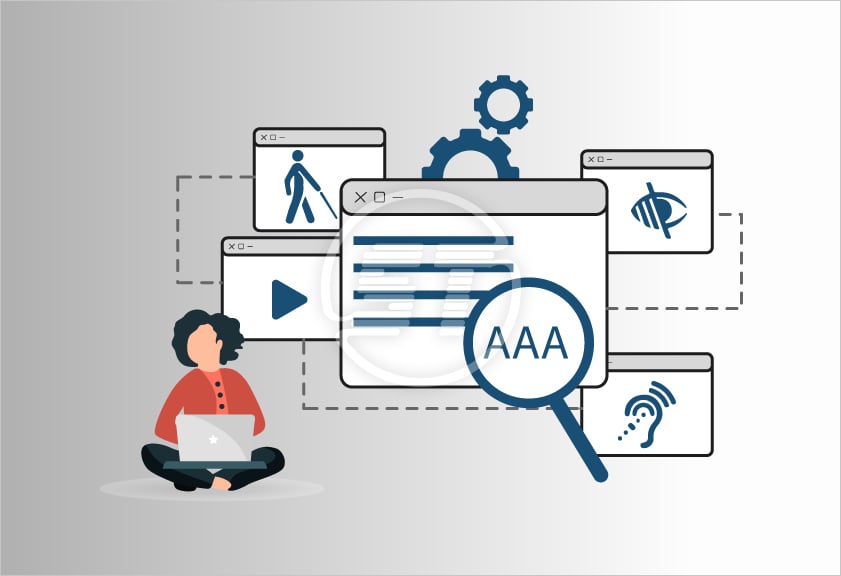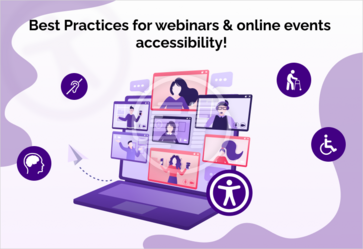Small and medium-sized businesses (SMBs) increasingly recognize the importance of web accessibility in creating inclusive digital experiences for people with disabilities. As companies strive to comply with accessibility laws and enhance their user experience, there is a growing demand for recurring accessibility services.
These services involve ongoing monitoring, auditing, remediation, and consulting to ensure websites remain accessible over time. This shift toward continuous accessibility is gaining traction for several key reasons. Read along to learn more.
What is the need for recurring accessibility services for SMBs?
Evolving legal and regulatory requirements
Web accessibility is not just a good-to-have feature; it’s a legal obligation in many jurisdictions. Laws for accessibility like the Americans with Disabilities Act (ADA) in the U.S., the European Accessibility Act, and many other enforce strict requirements for digital accessibility, and businesses are increasingly being held accountable for compliance. Failure to meet these standards can result in lawsuits, hefty fines, and reputational damage.
For SMBs, staying compliant isn’t a one-and-done task. Digital content, design, and development practices change frequently, and new content is constantly added to websites. This means accessibility issues can emerge over time even after an initial accessibility audit and remediation. Recurring accessibility services help ensure that SMBs continuously meet legal requirements by regularly monitoring and addressing new or existing accessibility issues.
Keeping up with web and technology updates
Web technologies and content management systems (CMS) are constantly evolving with regular updates and new features. These updates can unintentionally introduce accessibility barriers to websites and applications. For example, an update to a website’s CMS could affect how screen readers interact with certain elements or change the way keyboard navigation works.
Recurring accessibility services provide ongoing oversight to detect and fix any new issues that arise from these changes. By partnering with accessibility experts performing regular audit and testing, SMBs can stay ahead of technological changes that may impact their site’s accessibility. This proactive approach helps prevent new accessibility issues that can be costly and complex problems later.
Dynamic content and frequent updates
SMBs often have dynamic websites with frequently changing content, such as new blog posts, product updates, or event announcements. When new content is added or existing content is modified, it may introduce accessibility issues if not created with accessibility best practices in mind. Ensuring each update is accessible can be challenging without a structured process.
Recurring accessibility services include regular content reviews and ongoing training for content creators, which ensures that new content meets accessibility standards. This approach not only supports a more inclusive experience for all users but also helps avoid repeated cycles of audit and remediation.
Improving user experience and customer loyalty
Accessibility directly impacts user experience. A website that is accessible to people with disabilities is also more likely to offer an intuitive and seamless experience for all users, including those using mobile devices, voice search, or other assistive technologies.
When SMBs make their digital products accessible, they not only serve a broader audience but also demonstrate a commitment to inclusivity, which can enhance customer loyalty and brand reputation. Recurring accessibility services ensure that user experience improvements are consistently maintained and that accessibility enhancements keep pace with the evolving needs of users.
Why should agencies offer recurring accessibility services?
For digital agencies, providing recurring accessibility services can be a strategic move with several benefits. Here are why agencies should consider offering these services:
Differentiating in a competitive market
The demand for digital accessibility is growing, yet many agencies still treat it as an optional add-on rather than a core service. By offering dedicated recurring accessibility services, agencies can differentiate themselves from competitors. This specialization allows agencies to market their expertise in compliance, usability, and inclusive design, which can be a significant selling point, especially for SMBs that may not have in-house accessibility expertise.
Reducing risk for both clients and the agency
Agencies that provide only one-time accessibility fixes may inadvertently expose their clients to legal risks if issues arise later. Offering recurring services reduces the likelihood of lawsuits or penalties. Additionally, agencies can avoid potential liability by establishing themselves as ongoing accessibility partners, responsible for continuous monitoring and improvements rather than just a one-time fix.
Staying ahead of accessibility trends and best practices
Accessibility guidelines, such as the Web Content Accessibility Guidelines (WCAG), are periodically updated to reflect best practices and technological advancements. Agencies offering recurring accessibility services are in a better position to stay informed about these changes and adapt their clients’ digital properties accordingly. This proactive approach helps agencies to provide more value to clients and ensures they remain compliant with evolving standards.
Supporting inclusive brand image for clients
Recurring accessibility services demonstrate a commitment to inclusivity and social responsibility, making businesses more welcoming to all customers, including those with disabilities. Consistently addressing accessibility needs not only improves user experience but also enhances brand reputation and increases customer loyalty.
Increased revenue stream for the agency
Contact us today to explore how our expertise in website accessibility remediation can benefit your agency and its clients!
By offering ongoing accessibility services, such as regular website accessibility audit, content updates, training, and compliance monitoring, agencies can establish long-term relationships with clients.
Accessibility guidelines, such as the Web Content Accessibility Guidelines (WCAG)
Moreover, it allows agencies to upsell additional services, such as consulting on new projects or integrating accessibility into digital marketing strategies, further boosting revenue.
In a nutshell,
The shift towards recurring accessibility services among small and medium-sized businesses reflects a growing recognition of the long-term benefits of accessibility. As these businesses increasingly prioritize inclusivity, they are not only complying with legal requirements but also expanding their customer base, enhancing user experience, and strengthening their brand reputation. Recurring accessibility services provide SMBs with continuous monitoring and updates, ensuring that their digital content remains compliant and accessible as technology and regulations evolve.
Moreover, the services help agencies to outgrow their business. So, embracing recurring accessibility services benefits both SMBs and agencies by fostering a more inclusive digital landscape for all.
At Skynet Technologies, we provide comprehensive solutions to help your clients ensure their digital content is accessible to all users, enhancing their reach and compliance with accessibility standards. By partnering with us, your agency can offer cutting-edge services that not only drive business growth but also foster inclusivity. Let’s work together to make the digital world more accessible. Contact us today to explore how our expertise in website accessibility remediation can benefit your agency and its clients!


